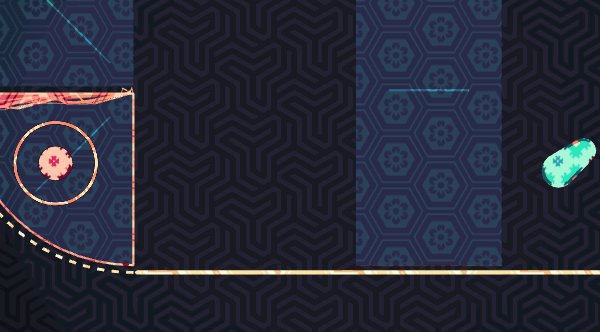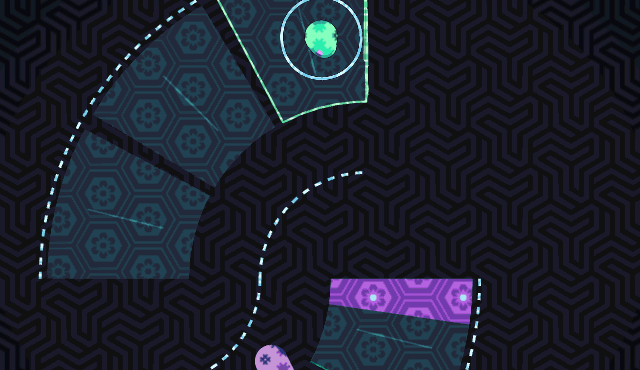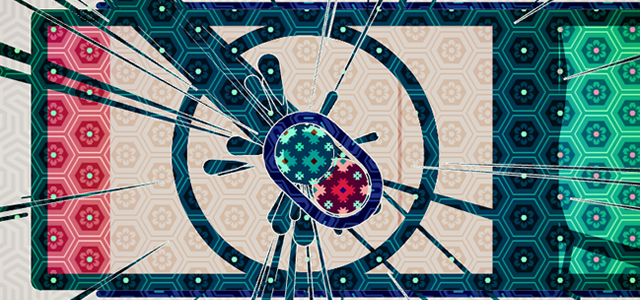JUMP TO
Introduction / Fundamentals / Dash / Cut / Wind / Ghost / Shoot / Poke / Nest / Pulse / Leech / Stim / Corp
PREVIOUS: Nest
PULSE
Expressed in the simplest terms, in BOTOLO you'll either want to press buttons when your opponent presses buttons and wait when they wait, or you'll want to press buttons when your opponent waits and wait when they press buttons. Regardless of which side you're on, half of your actions will involve active waiting. What if you ONLY want to press buttons, though? Pulse is here for you.
Most fighting games are built upon the rock-paper-scissors foundation of grab, block, attack. In a very loose sense... blocks beat attacks, grabs beat blocks and attacks beat grabs. The asymmetry provided by possession of the ball in BOTOLO, however, allows us to remove grabs while still preserving functional yomi. Inasmuch as Pulse is an active response to blocking, it could be thought of as BOTOLO's version of a grab.

That said, one cannot simply throw out pulses and expect the opponent to courteously block them. Every pulse should be in anticipation of a specific habit you've noticed in the other player, and not merely thrown out because you feel like pressing a button. I often see especially antsy players pulse from a distance further than their steal range, which is not likely to ever net points. Why would your opponent block if you're on the other side of the map?
By nature of its very existence, Pulse limits the length of your opponent's blocks. Normally, longer blocks benefit the defender, as they stand an improved chance of randomly catching a steal, however, longer blocks also stand an improved chance of randomly catching a pulse. If a defender consistently spends too long blocking, it may even be possible to react to their blocks with Pulse. Therefore, the length of the defender's block represents one of the central tensions between defender and attacker-as-Pulse. Too often spent blocking too long, and Pulse should net a great deal of points for free, no risky reads required. Too short, however, and the defender's block becomes less effective and more expensive against steals.

While you should discourage long blocks as Pulse, be careful not to overreact. A competent opponent will throw in short blocks with long blocks to bait out your Pulse and gain themselves points. Be constantly wary of when the opponent throws out blocks you cannot react to, and play on reaction only when prudent.
In my opinion, high level pulse play should involve pressing a button about four times per second until you get the ball. Since the opponent will either be blocking or not blocking, you should either be pulsing or stealing. Waiting should only be used as an option to scout out the opponent's blocking habits when uncertain.

Pay especially close attention to your very first encounter following a change of possession. If both the defender and attacker act with perfect randomness, 25% Pulse will strike sheild, gaining points for the attacker, 25% of the time Pulse will strike nothing, gaining points for the defender, 25% of the time Pulse will steal against block, gaining points for the defender, and 25% of the time Pulse will steal against nothing, gaining possession for the attacker. This gambit works out in your favor if you block on average once or more per possession of the ball, so you do need solid fundamentals up to a certain point to play this way. Of course, these numbers will feel as though they fluctuate dramatically within the space of a single match, given the relatively small dataset. Learning to discern between these random fluctuations and actual reads on the opponent's behavior is key to high level Pulse play.
Be constantly mindful of your habits following a pulse. These habits are easy to build and difficult to break. As a pulse player, your actions are more densely packed together, and things may turn sour quickly should the opponent get a solid read on you. I've played against people who lost entire zones in a matter of seconds simply because I'd memorized their flowchart of Pulse decisions.
NEXT: Leech